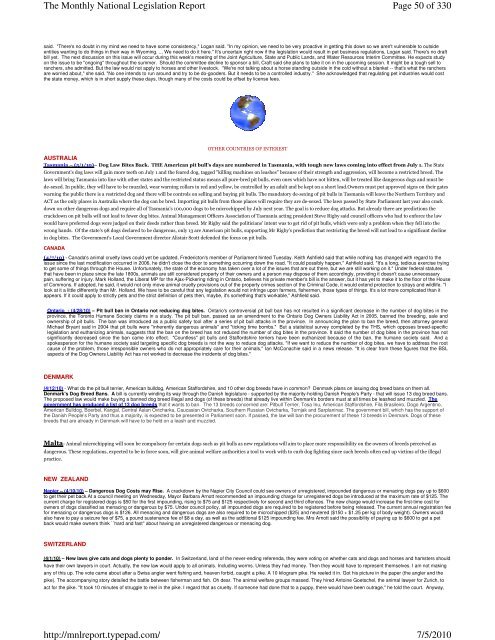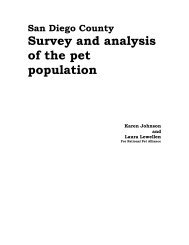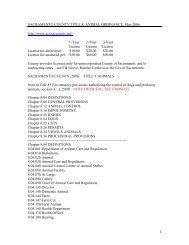Page 1 of 330 The Monthly National Legislation Report 7/5/2010 ...
Page 1 of 330 The Monthly National Legislation Report 7/5/2010 ...
Page 1 of 330 The Monthly National Legislation Report 7/5/2010 ...
Create successful ePaper yourself
Turn your PDF publications into a flip-book with our unique Google optimized e-Paper software.
<strong>The</strong> <strong>Monthly</strong> <strong>National</strong> <strong>Legislation</strong> <strong>Report</strong>http://mnlreport.typepad.com/<strong>Page</strong> 50 <strong>of</strong> <strong>330</strong>7/5/<strong>2010</strong>said. "<strong>The</strong>re's no doubt in my mind we need to have some consistency," Logan said. "In my opinion, we need to be very proactive in getting this down so we aren't vulnerable to outsideentities wanting to do things in their way in Wyoming. ... We need to do it here." It's uncertain right now if the legislation would result in pet business regulations, Logan said. <strong>The</strong>re's no draftbill yet. <strong>The</strong> next discussion on this issue will occur during this week's meeting <strong>of</strong> the Joint Agriculture, State and Public Lands, and Water Resources Interim Committee. He expects studyon the issue to be "ongoing" throughout the summer. Should the committee decline to sponsor a bill, Craft said she plans to take it on in the upcoming session. It might be a tough sell toranchers, she admitted. But the law would not apply to horses and other livestock. "We're not talking about a horse standing outside in the cold without a blanket -- that's what the ranchersare worried about," she said. "No one intends to run around and try to be do-gooders. But it needs to be a controlled industry." She acknowledged that regulating pet industries would costthe state money, which is in short supply these days, though many <strong>of</strong> the costs could be <strong>of</strong>fset by license fees.OTHER COUNTRIES OF INTERESTAUSTRALIATasmania – (5/1/10)– Dog Law Bites Back. THE American pit bull's days are numbered in Tasmania, with tough new laws coming into effect from July 1. <strong>The</strong> StateGovernment's dog laws will gain more teeth on July 1 and the feared dog, tagged "killing machines on leashes" because <strong>of</strong> their strength and aggression, will become a restricted breed. <strong>The</strong>laws will bring Tasmania into line with other states and the restricted status means all pure-bred pit bulls, even ones which have not bitten, will be treated like dangerous dogs and must bede-sexed. In public, they will have to be muzzled, wear warning collars in red and yellow, be controlled by an adult and be kept on a short lead.Owners must put approved signs on their gateswarning the public there is a restricted dog and there will be controls on selling and buying pit bulls. <strong>The</strong> mandatory de-sexing <strong>of</strong> pit bulls in Tasmania will leave the Northern Territory andACT as the only places in Australia where the dog can be bred. Importing pit bulls from those places will require they are de-sexed. <strong>The</strong> laws passed by State Parliament last year also crackdown on other dangerous dogs and require all <strong>of</strong> Tasmania's 100,000 dogs to be microchipped by July next year. <strong>The</strong> goal is to reduce dog attacks. But already there are predictions thecrackdown on pit bulls will not lead to fewer dog bites. Animal Management Officers Association <strong>of</strong> Tasmania acting president Steve Rigby said council <strong>of</strong>ficers who had to enforce the lawwould have preferred dogs were judged on their deeds rather than breed. Mr Rigby said the politicians' intent was to get rid <strong>of</strong> pit bulls, which were only a problem when they fell into thewrong hands. Of the state's 98 dogs declared to be dangerous, only 13 are American pit bulls, supporting Mr Rigby's prediction that restricting the breed will not lead to a significant declinein dog bites. <strong>The</strong> Government's Local Government director Alistair Scott defended the focus on pit bulls.CANADA(4/7/10) - Canada's animal cruelty laws could yet be updated, Fredericton's member <strong>of</strong> Parliament hinted Tuesday. Keith Ashfield said that while nothing has changed with regard to theissue since the last modification occurred in 2006, he didn't close the door to something occurring down the road. "It could possibly happen," Ashfield said. "It's a long, tedious exercise tryingto get some <strong>of</strong> things through the House. Unfortunately, the state <strong>of</strong> the economy has taken over a lot <strong>of</strong> the issues that are out there, but we are still working on it." Under federal statutesthat have been in place since the late 1800s, animals are still considered property <strong>of</strong> their owners and a person may dispose <strong>of</strong> them accordingly, providing it doesn't cause unnecessarypain, suffering or injury. Mark Holland, the Liberal MP for the Ajax-Pickering riding in Ontario, believes his private member's bill is the answer, but it has yet to make it to the floor <strong>of</strong> the House<strong>of</strong> Commons. If adopted, he said, it would not only move animal cruelty provisions out <strong>of</strong> the property crimes section <strong>of</strong> the Criminal Code, it would extend protection to strays and wildlife. "Ilook at it a little differently than Mr. Holland. We have to be careful that any legislation would not infringe upon farmers, fishermen, those types <strong>of</strong> things. It's a lot more complicated than itappears. If it could apply to strictly pets and the strict definition <strong>of</strong> pets then, maybe, it's something that's workable," Ashfield said.Ontario - (4/28/10) – Pit bull ban in Ontario not reducing dog bites. Ontario's controversial pit bull ban has not resulted in a significant decrease in the number <strong>of</strong> dog bites in theprovince, the Toronto Humane Society claims in a study. <strong>The</strong> pit bull ban, passed as an amendment to the Ontario Dog Owners Liability Act in 2005, banned the breeding, sale andownership <strong>of</strong> pit bulls. <strong>The</strong> ban was introduced as a public safety tool after a series <strong>of</strong> pit bull attacks in the province. In announcing the plan to ban the breed, then attorney generalMichael Bryant said in 2004 that pit bulls were "inherently dangerous animals" and "ticking time bombs." But a statistical survey completed by the THS, which opposes breed-specificlegislation and euthanizing animals, suggests that the ban on the breed has not reduced the number <strong>of</strong> dog bites in the province. It said the number <strong>of</strong> dog bites in the province has notsignificantly decreased since the ban came into effect. "Countless" pit bulls and Staffordshire terriers have been euthanized because <strong>of</strong> the ban, the humane society said. And aspokesperson for the humane society said targeting specific dog breeds is not the way to reduce dog attacks. "If we want to reduce the number <strong>of</strong> dog bites, we have to address the rootcause <strong>of</strong> the problem, those irresponsible owners who do not appropriately care for their animals," Ian McConachie said in a news release. "It is clear from these figures that the BSLaspects <strong>of</strong> the Dog Owners Liability Act has not worked to decrease the incidents <strong>of</strong> dog bites."DENMARK(4/12/10) - What do the pit bull terrier, American bulldog, American Staffordshire, and 10 other dog breeds have in common? Denmark plans on issuing dog breed bans on them all.Denmark's Dog Breed Bans. A bill is currently winding its way through the Danish legislature - supported by the majority-holding Danish People's Party - that will issue 13 dog breed bans.<strong>The</strong> proposed law would make buying a banned dog breed illegal and dogs (<strong>of</strong> these breeds) that already live within Denmark's borders must at all times be leashed and muzzled. <strong>The</strong>government has produced a list <strong>of</strong> 13 dog breeds that it wants to ban. <strong>The</strong> 13 breeds concerned are: Pitbull Terrier, Tosa Inu, American Staffordshire, Fila Brasileiro, Dogo Argentino,American Bulldog, Boerbel, Kangal, Central Asian Ovtcharka, Caucasian Ovtcharka, Southern Russian Ovtcharka, Tornjak and Sarplaninac. <strong>The</strong> government bill, which has the support <strong>of</strong>the Danish People’s Party and thus a majority, is expected to be presented in Parliament soon. If passed, the law will ban the procurement <strong>of</strong> these 13 breeds in Denmark. Dogs <strong>of</strong> thesebreeds that are already in Denmark will have to be held on a leash and muzzled.Malta- Animal microchipping will soon be compulsory for certain dogs such as pit bulls as new regulations will aim to place more responsibility on the owners <strong>of</strong> breeds perceived asdangerous. <strong>The</strong>se regulations, expected to be in force soon, will give animal welfare authorities a tool to work with to curb dog fighting since such breeds <strong>of</strong>ten end up victims <strong>of</strong> the illegalpractice.NEW ZEALANDNapier – (4/10/10) – Dangerous Dog Costs may Rise. A crackdown by the Napier City Council could see owners <strong>of</strong> unregistered, impounded dangerous or menacing dogs pay up to $600to get their pet back.At a council meeting on Wednesday, Mayor Barbara Arnott recommended an impounding charge for unregistered dogs be introduced at the maximum rate <strong>of</strong> $125. <strong>The</strong>current charge for registered dogs is $50 for the first impounding, rising to $75 and $125 respectively for second and third <strong>of</strong>fences. <strong>The</strong> new charge would increase the first-time cost forowners <strong>of</strong> dogs classified as menacing or dangerous by $75. Under council policy, all impounded dogs are required to be registered before being released. <strong>The</strong> current annual registration feefor menacing or dangerous dogs is $126. All menacing and dangerous dogs are also required to be microchipped ($25) and neutered ($150 + $1.25 per kg <strong>of</strong> body weight). Owners wouldalso have to pay a seizure fee <strong>of</strong> $75, a pound sustenance fee <strong>of</strong> $8 a day, as well as the additional $125 impounding fee. Mrs Arnott said the possibility <strong>of</strong> paying up to $600 to get a petback would make owners think ``hard and fast'' about having an unregistered dangerous or menacing dog.SWITZERLAND(4/1/10) – New laws give cats and dogs plenty to ponder. In Switzerland, land <strong>of</strong> the never-ending referenda, they were voting on whether cats and dogs and horses and hamsters shouldhave their own lawyers in court. Actually, the new law would apply to all animals. Including worms. Unless they had money. <strong>The</strong>n they would have to represent themselves. I am not makingany <strong>of</strong> this up. <strong>The</strong> vote came about after a Swiss angler went fishing and, heaven forbid, caught a pike. A 10 kilogram pike. He reeled it in. Got his picture in the paper (the angler and thepike). <strong>The</strong> accompanying story detailed the battle between fisherman and fish. Oh dear. <strong>The</strong> animal welfare groups massed. <strong>The</strong>y hired Antoine Goetschel, the animal lawyer for Zurich, toact for the pike. "It took 10 minutes <strong>of</strong> struggle to reel in the pike. I regard that as cruelty. If someone had done that to a puppy, there would have been outrage," he told the court. Anyway,




